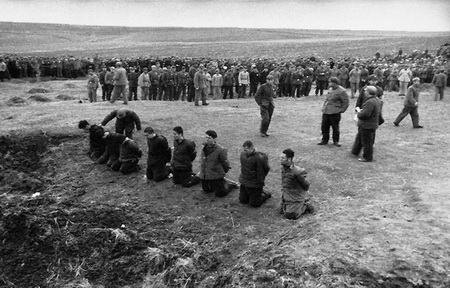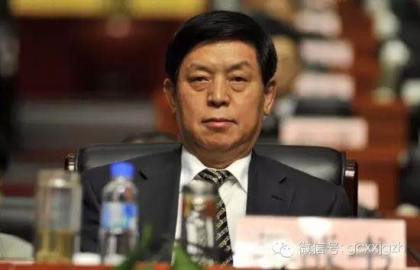Tragic day: 50 years ago in Communist China began the unprecedented scale of atrocities political campaign, instigated by the leader of the Communist party Mao Zedong – the so-called “cultural revolution”. It lasted about 10 years (1966-1976гг.), the total number of repressed evaluated in many millions of people. Stalin 1937 – just a kindergarten compared to this bloody Chinese decade.
Mao Zedong 
Maoism (Chinese. UPR. 毛泽东思想, Pinyin: Máo Zédōng Sīxiǎng) — political theory and practice, which are based on the ideological system of Mao Zedong. Was adopted as the official ideology of the CCP and the PRC until his death in 1976. The essence of Maoism is the classic combination of Communist ideas with velichanski chauvinism and Sino-centrism. If simpler is a Chinese version of Stalinism: the totalitarian state, the personality cult of the leader with unlimited power, periodic mass terror to intimidate the population, a planned command economy. In the village were the same farms, only referred to as communes with an even higher level of socialization of property. The people lived in poverty, the economy was extensive, with an emphasis on heavy industry and arms production.
Put forward by Mao Zedong the thesis of “class struggle as the main contradiction” is very reminiscent of the Stalinist “about the aggravation of class struggle” as the construction of communism.
The first “sweep” their opponents-the party of Mao held in Jiangxi province in 1930-31 on false charges “AB-Tuana”. As you can see, at the time of the Stalinist and Maoist “purges” are practically the same. In the USSR at this time were the mass Stripping for “pests” and the former tsarist officers.
Public execution of “enemies of the people” 
Massive industrialization in Communist China started very late. It was called the party “Great leap forward” and was launched in 1958. All rural and partly urban population of the country was organized into Autonomous “communes”. Life in the communes was in a state of extreme collectivized — with the introduction of the collective canteens of private life and property were practically eradicated. Each commune was supposed not only to provide for themselves and the surrounding towns with food, but to produce industrial products, such as metal, which is smelted in small furnaces in the back yards of members of the commune: therefore, it was expected that mass enthusiasm make up for lack of professionalism.
Industrialization in Chinese 
Policy of “Great leap forward” ended in glorious failure. The quality produced in the communes of the products was extremely low, processing of collective fields due to low motivation went from bad to worse. Two years later, food production fell disastrously low level. In 1959-1961 the country was gripped by the greatest famine, which killed, according to various estimates, from 10 to 40 million people. With the mass deaths from starvation, the Soviet Communists far ahead of the Chinese: millions of people in the USSR died from the effects of malnutrition in 1920-21 and 1932-33.
In 1959, the leftist views of Mao lead to the rupture of relations between China and the Soviet Union, which departed from Stalinism. USSR withdraws from China all experts who helped to raise the country’s economy and stop the financial help. On the Soviet-Chinese border during this period there were a number of serious military clashes ended in the complete defeat of Chinese troops. The most famous incidents in the area o the Sino-Soviet border and the village of Zhalanashkol.
After the failure of the great leap forward and the defeats in border conflicts with the Soviet Union the position of Mao in the country has suffered greatly. In 1966—1976гг. Mao organized the so-called “cultural revolution” under the pretext of countering a possible “restoration of capitalism” in China and “struggle against internal and external revisionism.” In fact, the main goal was to destroy any political opposition and install a regime of unlimited personal power. The application of the ideas of Mao in practice led to this internal “war of all against all”. Under the vague definition of the class enemies of the proletariat, coming from Mao, could get anyone, from the average peasant to the highest party worker. But worst of all was the native traditions: the former feudal lords, the clergy, intellectuals, etc. the Power is given into the hands of the masses, turned into a primitive anarchy and anarchy. It temporarily seized a gang of young “rebels” — the red guards (students) and the rebels (of young workers) who were allowed to act with virtual impunity. These units were killed, subjected to torture and humiliation hundreds of thousands of people. In August 1967, the Beijing newspaper wrote: “Animoisty is running amuck in the streets… Kill rats, kill them!” Closed all bookstores with the ban on the sale of any books, except one: the quotations of Mao. The quotations were produced in many design options: one of them cover quotations was made of hard plastic, which had no traces of blood. Such quotations were beaten to death many people, when from their lips was forced the bourgeois poison”. The red guards cut off his braids and shaved off dyed hair of women and tore at his too tight pants, break off high heels on women’s shoes, were broken in half, pointy shoes. In Canton in July — August 1967 in armed clashes between troops and red guards “Red banner”, on the one hand, and the “Wind of communism” on the other, killed about 900 people, and the shootings involved guns. In Gansu province for 50 cars strapped with a wire or a wire of people and stabbed them with knives until they were a bloody mess.
Traditional Chinese culture was forgotten: the ancient Chinese had destroyed thousands of historical monuments, books, paintings, temples. Were destroyed almost all monasteries and temples in Tibet. The red guards tore down part of the great wall of China, taken out of her by using bricks to build a “more necessary” of pigsties. Similarly, in the Soviet Union under the Bolsheviks massively destroyed temples and historical monuments. Maoism, and Stalinism, ceased to exist with the death of the leader.
“Cultural revolution” was not and cannot be a revolution or social progress in any sense… it was the turmoil caused by the fault from the top of the head and used the counter-revolutionary factions, the turmoil that brought a serious disaster of the party, the state and the multinational people.” From the decision of the CPC Central Committee (1981)

The Reforms Of Deng Xiaoping.
In the late 70-ies on the initiative of the wing pragmatists in the Communist party of China (CPC) led by Deng Xiaoping, was proclaimed “the policy of reform and opening” – Chinese restructuring. China shifted from a closed, centrally planned system to a market economy, which is now the largest in the world. The reform started with de-collectivization of agriculture and expanded by the gradual liberalization of prices, increased autonomy for state enterprises, creation of a diversified banking system, development of stock markets, rapid growth of the private sector, increasing openness to foreign trade and investment.
Deng Xiaoping 
The Chinese Communists managed to overcome a heavy legacy of Maoism, not only bring huge country out of the impasse, but also to achieve outstanding success in the fields of economy and improvement of people’s life. According to the IMF in the 1st half of 2014 GDP PPP of China according to preliminary results, ahead of GDP at PPP USA. China has a commanding lead in the world in terms of exports and many other important indicators. Each year China produces over 20 million vehicles is more than it produces, the U.S. and Japan combined.
Modern China 
Sources:
http://dic.academic.ru/dic.nsf/ruwiki/370940″ rel=”nofollow”>http://dic.academic.ru/dic.nsf/ruwiki/37094
http://dic.academic.ru/dic.nsf/ruwiki/370940″ rel=”nofollow”>http://dic.academic.ru/dic.nsf/ruwiki/814700
https://ru.wikipedia.org/wiki/Культурная_революция_в_Китае
The documentary “Maoism – the tragedy of China” http://rutube.ru/video/054111ad55efe3df8c65913c048a4a01/








